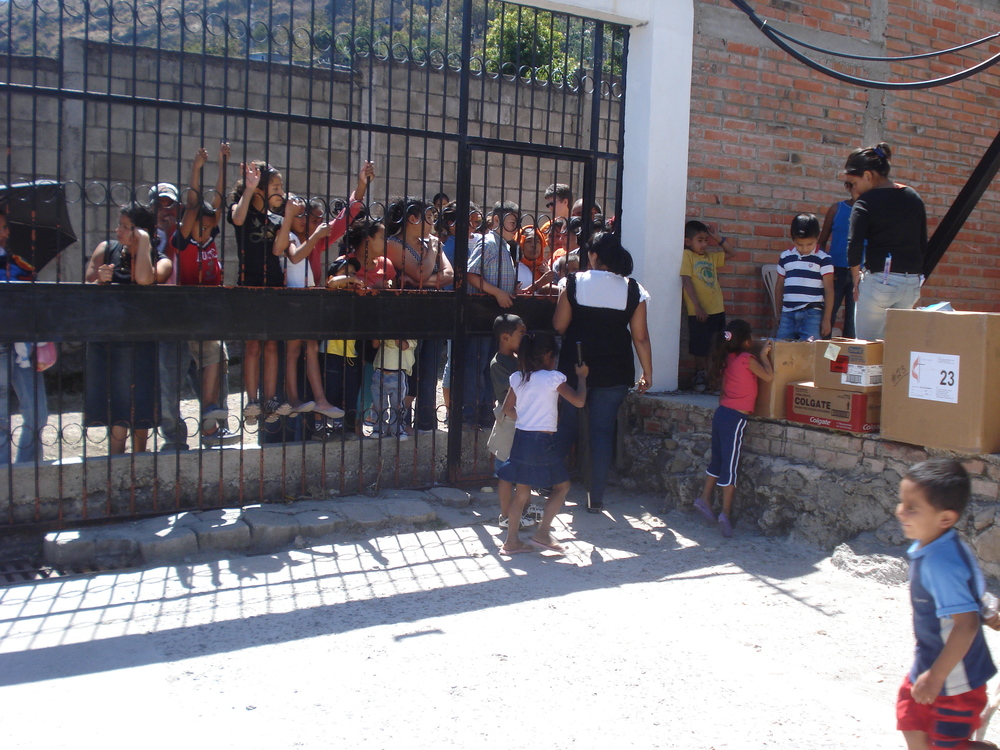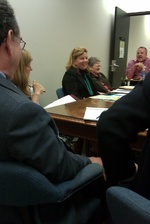Unity at the Heart of a Medical Mission Trip to Honduras
By Catelynn Kenner
Toncontín airport in the Honduran capital of Tegucigalpa is known for its excessively steep and dangerous approach, and short, sometimes deadly, runway. The country itself is regarded as the murder capital of the world. The government reeks of corruption, power lust, bloody revenge, and uselessness. And yet this odd corner of the world, in the neighborhood of Fuerzas Unidas (United Strengths), is where my heart lies, awaiting my return year after year.
I first had the opportunity to travel to this Central American country, roughly the size of Kentucky, in February 2008. I was a naive 18 year old who had never left the U.S., much less encountered poverty at the unsightly level that it exists for most of Honduras. That trip changed my life as has each subsequent trip.
Though I am consistently blown away by the literally miraculous work I see each year, this year’s trip took on an even deeper meaning for me. Never have I fully appreciated the health mission team for what it is, how it is, or why it is, nor for each member as a professional and individual until now. I offer my reflections as solely a glimpse of the glory of God shining so blindingly and brilliantly through the work of this ecumenical, medical mission trip.
The team
The team was beautifully orchestrated by core leaders from Frankfort First United Methodist Church, Good Shepherd Catholic Church (Frankfort), and St. John Chrysostom Catholic Church (Eminence) with team members from Central Kentucky representing Quest Community Church (Lexington), Graefenburg Baptist Church, Forks of Elkhorn Baptist Church (Frankfort), First Christian Church (Frankfort), Embrace United Methodist Church (Lexington), Southland Christian Church (Lexington), in partnership with Resurrection UMC (Louisville) and Eastwood UMC (Louisville), and with prayers coming from both around our nation and Honduras. 
The team offered medical (general, pediatric, obstetrical and gynecological), dental (cleanings, restorative, extractions), and pharmaceutical care as well as health education and technical support (electrical, plumbing, woodworking) for the church-temporarily-turned-clinic. On this particular trip, plans for a church-run, micro-business bakery currently in construction was added to our agenda. This year’s patient flow ultimately clocked in just short of 1,300 patients after 3 full days (about 8 hours each) and 2 half-days (about 5 hours each) not including Fluoride treatments given to hundreds of students at a nearby Elementary school.
The need
 Families and individuals began gathering at the gate of the church for clinical attention during the twilight hours of the morning and many had to be turned away for a lack of time each afternoon. The faithful showed up early the next day ready to receive care. I met a young mother who had been making the trip to the clinic with her child since 4:00 a.m., a dangerous time for anyone to roam the streets - especially as a woman, and with a small boy. She was not even close to the front of the line when we began admitting patients. A 72 year-old woman told one of the dentists she had walked for 3 hours down a steep mountain pass to get to the clinic that morning- to have her teeth pulled. These stories are not unique.
Families and individuals began gathering at the gate of the church for clinical attention during the twilight hours of the morning and many had to be turned away for a lack of time each afternoon. The faithful showed up early the next day ready to receive care. I met a young mother who had been making the trip to the clinic with her child since 4:00 a.m., a dangerous time for anyone to roam the streets - especially as a woman, and with a small boy. She was not even close to the front of the line when we began admitting patients. A 72 year-old woman told one of the dentists she had walked for 3 hours down a steep mountain pass to get to the clinic that morning- to have her teeth pulled. These stories are not unique.
Once in the gate, patients registered for medical and/or dental services and paid a minimal fee, equivalent to a US nickel, to be seen. From there they moved to Triage where vitals were taken- blood pressure, pulse, height and weight, and into Intake where medical histories were obtained and patients were directed to the appropriate provider. After being seen, patients attended a health education station to learn about proper dental health, nutrition, and clean drinking water. As an added treat this year, Eastwood UMC and Resurrection UMC provided funds for Bibles to be given to each family represented at the clinic. After receiving the gift patients headed to our make-shift, yet well-stocked pharmacy. There, prescriptions were filled for free and patients received clear instructions on how and when to take each medicine.
Continuity
Daily, the team met Hondurans with many tears of joy, of hope, of gratitude. And the feelings were mutual. It was blatantly obvious that the work done- by both qualitative and quantitative measures- was benefitting the community. We have begun to see systematic change in the surrounding neighborhoods after 10 years of consistent trips to the clinic and yearly, renewed relationship-building. Just as in the US, one visits her or his healthcare provider around once a year and gets to know the provider more deeply each trip. The patient base built in Fuerzas Unidas is no exception. Some patients have been seen annually by the same providers for each of the years the team has come to “The Hill,” as it is lovingly referred to. Increasing, health literacy is one of several sustainable changes being reaped from the work of the team, a legacy that extends throughout the year when patients seek the minimal (unaffordable and inaccessible) healthcare available to them during the team’s absences. We see young women become mothers, babies grow in stature, weight and ability, patients heal after injuries and procedures -- the list goes on.
With a young child lying in a dental chair (read: a beach chair covered in thin plastic atop four cement blocks), a dental care provider was astonished to see no signs of decay in the patient’s mouth. After routinely needing to pull five or six teeth a time, even in children, this came as such a shock that the provider asked the mother how it was that her child appeared to be taking such great care of his teeth. The mother replied that seven years ago she came to the clinic for the first time and learned how sugar can rot children’s teeth. Standing in bold contrast to the cultural norm she outlawed sugary treats in the house and taught her child to care for his teeth. Consistent, loving, educational care on behalf of the team has explicitly led to inclines in patient health and health literacy.  Mary Ann Burch, Hygienist, is from Good Shepherd in Frankfort
Mary Ann Burch, Hygienist, is from Good Shepherd in Frankfort
Diversity
As I observed more and more of these miracles I began to wonder what it is that makes this team tick, what is it the yields such a positive, productive, fun, life-changing experience for both patients and clinic workers alike. I have come to believe, whole-heartedly, that it is the fundamentally ecumenical nature of the team that brings about this unique experience.
Most glaringly, at the base of all interactions among workers and between workers and patients is the base of mutual love from which the relationships are built. When we choose not to operate under the banner of one “brand” of Christianity we open ourselves up to focusing on the major tenets of our faith. We all agree on love. We all agree on compassion. We all agree on justice. We agree on being the best neighbors, the best sisters and brothers we can be to those around us. All the details in the fabric balance each other out when we join hands in the name of Christ’s love.
Ministry is easier from both the perspective of team members and those being ministered to when we cast away divisive squabbles over theological fine print. We have the opportunity to learn from the perspectives of team members of other denominations as we encounter one another’s personal faiths intimately in action. And through the eyes of those we minister to, we are not viewed as lofty missionaries with an agenda for the XYZ Church. We are simply lovers of Christ who feel the deep need to pass along the compassion we feel for our sisters and brothers around the world. We are not confined to one label - only the banner of Christ’s deep love. In a conversation with Arnie LeMay, our clinic engineer from Eminence Catholic Church, he told me that “Compassion is not stooping over (to reach someone), but walking alongside them.” When we are more accessible and less intimidating to those coming into the clinic (especially of other faith walks), we can more effectively minister more personally while caring for their physical needs as well.
Secondly, when denominational labels are used for mission trips we tend to cut off support, resources, gifts, and talents of our neighbors in other churches. In the phenomenal book Half the Sky the authors, Sheryl WuDunn and Nicholas D. Kristof, tell the story of Bill Gates giving a speech in Saudi Arabia. A curtain barrier separated the audience- 4/5 men and 1/5 women. At the end of his lecture there was an open forum and an audience member asks if it is realistic for Saudi Arabia to become a Top Ten country in technology by 2010. Mr. Gates responds candidly and boldly. “Well, if you’re not fully utilizing half the talent in the country, you’re not going to get close to the Top Ten.”
Similarly, if we begin to work together for the common good we begin to fully mobilize the best of the best. Without limits based on denominations the team was able to utilize the expertise of a Methodist OB/GYN and internist, a Catholic dental hygienist, pharmacy technician, Physical Therapist, clinic manager and engineer, a Baptist Nurse Practitioner, and non-denominational dentists, health educator, pharmacist, etc. Each piece of the puzzle, each member of the body of Christ, serving in a critical role - we simply could not function well without even just one of them.
At the most basic level, if we did not function ecumenically, the team would not have reached the community to the extent - in geographical breadth and personal depth alike - that it has today, nor the way it continues to even as I write and preparations are already in motion for 2014. Originally, the team started as 11 members of United Methodist churches of Frankfort and Somerset in 2003. After two years the contagious nature of the work spread to the Catholic church in Frankfort and soon began branching out across denominations and the country as friends and family members began to get involved upon hearing of the life-changing experiences of team members. The community continues to grow today.
Today, when one could name a good number of hair-splitting, hot button issues that could be contorted into reasons not to work in unity with one another, to not reach out in one accord-we offer our hands to the world of mission work. As the Kentucky Council of Churches’ Constitutional Preamble states:
Our unity is both a gift and a challenge, calling us to interdependence as intimate as the members of a single body (I Corinthians 12), the branches of a single vine (John 15), the stones of a single house (I Peter 2)—a unity that preserves the dignity of our diversity and which gives us a common ministry for justice, peace, and the integrity of creation under the leading of the Holy Spirit.
To God be the glory- for what has been done for Hondurans and United States citizens over the decade of work in Tegucigalpa- in physical and spiritual healings, for what He has planned for the next year, and for all the years thereafter. Amen and Amen.
Ms. Catelynn Kenner is serving as the 2013 Health Intern for the Kentucky Council of Churches and as the Wellness and Community Director for Beuchel United Methodist Church in Louisville. A graduate of Transylvania University, she begins the Master of Public Health program at Emory in August. She wishes to acknowledge the assistance she received with this article from Jeremiah and Cindy Littleton, Jim Buriss and Arba Kenner (all of Frankfort First United Methodist), Arnie LeMay (of St. John Chrysostom Catholic Church in Eminence).








